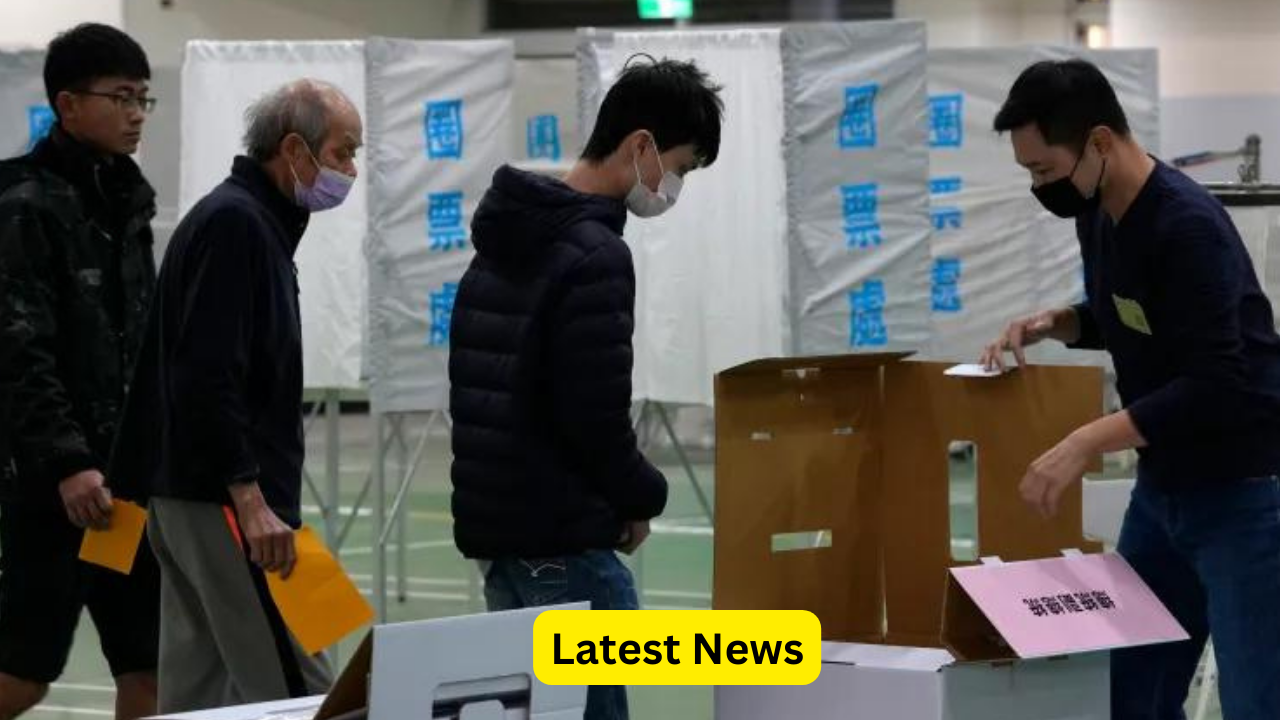There is a high anticipated turnout for the vote count in the 2024 elections, and the results should be known in a few hours.
Taipei, Taiwan Taiwan’s highly anticipated presidential and parliamentary elections have begun, and preliminary returns indicate that the ruling party’s nominee is leading handily.
Surprisingly, there are three candidates running for president: veteran New Taipei City mayor Hou Yu-ih of the more conservative Kuomintang (KMT), incumbent vice president William Lai Ching-te of the ruling Democratic Progressive Party (DPP), and Ko Wen-je of the Taiwan People’s Party, running as a third party.
Taiwanese media reported that Lai has a substantial lead over his two challengers, with more than half of the ballots tabulated.
The future course of Taiwan’s democracy is in question: will the DPP continue to push for greater international recognition as a de facto independent state; will the KMT pursue closer, better commercial links with China; or will the TPP seek an innovative but unproven middle ground between the two parties?
There are six seats reserved for Indigenous Taiwanese in Taiwan’s unicameral legislature, which consists of 113 members chosen by a party’s percentage of votes and geographic area.
The DPP narrowly won a legislative majority in the previous election, but the KMT and TPP’s strong showing in numerous municipal contests makes this time’s election much more competitive.
19.5 million people over the age of 20 were eligible to vote, and statistics from public transportation indicate that large voter participation is anticipated.
Taiwanese citizens must vote in person in the place where their household registration was made, which is usually their hometown. For this reason, the island’s rail system can get quite congested in the run-up to elections.
The Taiwan Railway Administration forecast record ticket sales on Friday of 758,000, more than in any other election.
It was a surprise turnaround for what has been a relatively weak campaign season centered on domestic matters, according to Brian Hioe, a regular observer of Taiwanese politics and founder of New Bloom Magazine.
“I think it shows how quickly things can change in Taiwanese politics,” he said, adding that “shortly before train ticket sales were not doing that well, there was a sudden rebound.”
People mobilize because they worry about what will happen if X candidate wins or if turnout at a rally is higher than anticipated,” Hioe added.
Two significant occurrences, according to Hioe, may have scared off some voters this week from casting ballots: the first was the record 350,000 attendees at a rally for third-party candidate Ko on Friday, demonstrating to voters that he was a serious contender despite the relative inexperience of his party.
Even though Ma has been out of the presidency for a long time, Hioe suggested that some voters might be concerned about his influence over KMT candidate Hou.
Taiwan’s de facto independence is being threatened by Beijing, which many Taiwanese believe is a province, and they want their democracy to survive.
Beijing often relies on a combination of “carrot and stick” methods to try to seduce people and also scare them into voting for their favorite candidates at election time—typically anyone other than the DPP.
Polls had been bustling since they opened early on Saturday, voters said.
Taipei resident Jason Wang said his goal to get to the polls early with his wife and kids was put off slightly by a shockingly long and diverse queue for 8 a.m.
The lack of senior citizens in the area was unexpected. Instead, there were a lot of young couples, and by that, I mean people who would go out and party on Friday nights,” he said.
A young DPP fan in his 20s named Guava Lai claimed that on Friday night, friends’ terrified remarks on social media suggested that candidate Ko would win.
Taiwan’s two major parties, the KMT and DPP, ought to have switched seats in a typical election, but Ko has thrown off the expected course.
The vocal former Taipei mayor has gained favor with younger people who claim they desire change from the previous two-party system.
Among them is 25-year-old Nicky, who declined to give her full name and told Al Jazeera that she had voted for Ko on Saturday as she left an elementary school polling place in Taipei. She cited Ko’s record as mayor, his can-do mentality, and his simpler communication style as reasons for her support.
She responded, “He can really get things done and solve problems. “He was the mayor of Taipei for eight years,” she said, eliciting the agreement of her companions. “That is what you want.”
Nicky wanted to demonstrate her support for Ko even though she was unsure of her chances of winning because the majority of older voters favor Taiwan’s two traditional parties.
Taipei-based lawyer and political analyst Ross Feingold shared some of her concerns.
He emphasized that other people have concerns about matters other than China, such as openness in public service.
“Just like in other countries, there are recurring corruption and nepotism issues under the leadership of various political parties in Taiwan, and I believe voters here want to know that the person who will lead them for the next four years is an honest man,” he told Al Jazeera.

[…] who seems to have developed a strong interest in cricket of late, commented on X (previously Twitter): “Thank you for these kind words, […]